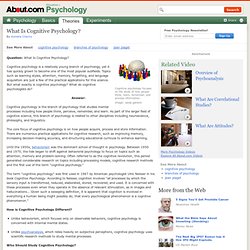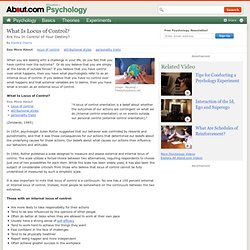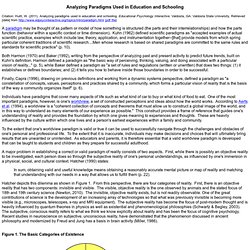

What Is Cognitive Psychology? The Science of How We Think. Question: What Is Cognitive Psychology?

Cognitive psychology is a relatively young branch of psychology, yet it has quickly grown to become one of the most popular subfields. Topics such as learning styles, attention, memory, forgetting, and language acquisition are just a few of the practical applications for this science. But what exactly is cognitive psychology? What do cognitive psychologists do? Answer: Cognitive psychology is the branch of psychology that studies mental processes including how people think, perceive, remember, and learn.
The core focus of cognitive psychology is on how people acquire, process and store information. Until the 1950s, behaviorism was the dominant school of thought in psychology. Paradigm Shift - A Scientific Revolution. A paradigm shift, suggested by Thomas Kuhn, is not just a small change in science, or the modification of a theory.

It is a scientific revolution and completely changes the way in which science looks at the world. It often dictates how the public looks at the world. For example, Darwin’s theories were intensely debated by scientists and theologians. This debate spilled over into the public consciousness, and newspapers became filled with cartoons and caricatures. Thestudentroom.co. TSR Wiki > Study Help > Subjects and Revision > Revision Notes > Psychology > Is Psychology a Science Discuss arguments for and against the claim that psychology is a science. (30 marks) To decide whether psychology is a science, we firstly have to define a ‘science’.

A science is ‘objectively obtaining data and organizing it into theories’. A science follows a process, when investigating anything scientific. Firstly, inductive reasoning takes place whereby the investigator looks at the science/idea around its subject. Secondly, a generalization is made about that subject matter and a hypothesis is formed. A science is characterised by the fact that it is supposed to our objective and the variables tested need to be testable, among others. Firstly, objectivity – for a subject to be a science, it needs to be objective in that the researcher imposes no ideas, which may be biased to what they believe in their study. The third thing that does establish is causality. Other Useful Articles. The Curious Wavefunction, Scientific American Blog Network. Most people would place Nobel Laureate Daniel Kahneman's work in psychology within the realm of "science" (Image: Quicklet) Fellow Scientific American blogger Melanie Tannenbaum is flustered by allegations that psychology is not a science and I can see where she is coming from.

In this case the stimulus was a piece by Alex Berezow, a microbiologist, who in a short and provocative piece in the LA times argued the case that psychology is not a real science. I think he's right. I also think that he misses the point. Berezow's definition of science is not off the mark, but it's also incomplete and too narrow. The Psychology of the "Psychology Isn't a Science" Argument. Every so often the internet is set ablaze with opinion pieces on a familiar question: Are "soft" sciences, like psychology, actually science?
Most of the time the argument against psychology as a science comes from people from the so-called harder sciences (you know, people who don't know ish about psychology). Of course, every once in a while we throw ourselves under the bus by declaring that for our softer sciences to be taken seriously, we must be more like the real sciences. You're still reading this so most likely you are interested in my opinion on this topic.
With a quick nod to others who have covered this topic here, here, here, and here, let's review some of the arguments for and against psychology as a science in what follows. I. Whenever I read a story about how psychology isn't a real science it is usually accompanied by mentions of some psychologists (and I use the term loosely here) engaging in unscientific things. II. III. IV. This post appeared on Psych-Your-Mind. What is OBJECTIVITY? definition of OBJECTIVITY (Psychology Dictionary) What Is the Meaning of Locus of Control? When you are dealing with a challenge in your life, do you feel that you have control over the outcome?

Or do you believe that you are simply at the hands of outside forces? If you believe that you have control over what happens, then you have what psychologists refer to as an internal locus of control. If you believe that you have no control over what happens and that external variables are to blame, then you have what is known as an external locus of control. What Is Locus of Control? "A locus of control orientation is a belief about whether the outcomes of our actions are contingent on what we do (internal control orientation) or on events outside our personal control (external control orientation). " In 1954, psychologist Julian Rotter suggested that our behavior was controlled by rewards and punishments, and that it was these consequences for our actions that determined our beliefs about the underlying causes for these actions.
What Is a Simple Experiment? When researchers are trying to determine if changes in one variable lead to changes in another variable, they must perform experiments in order to establish a causal relationship.

Other research methods (such as correlational studies) can be used to establish that a relationship between to variables exists, but an actual experiment is necessary to establish that it is a cause-and-effect type of relationship. Experiments can be extremely complex and included a multitude of variables. Paradigm. Analyzing Paradigms Citation: Huitt, W. (2011).

Analyzing paradigms used in education and schooling. Educational Psychology Interactive. Valdosta, GA: Valdosta State University. Retrieved [date] from file] Login.seam?ERIGHTS_TARGET=http%3A%2F%2Fpsycnet.apa. Research Methods in Psychology: The Scientific Method.